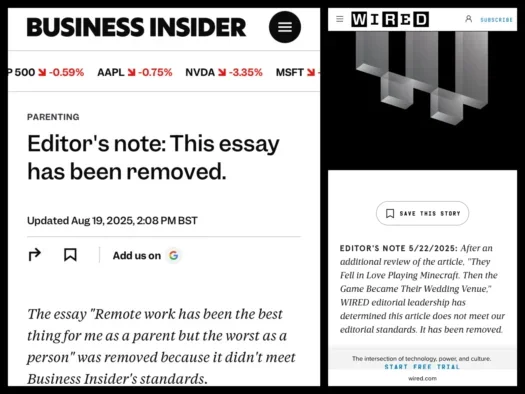
Wired and Business Insider have removed news features written by a freelance journalist after concerns they are likely AI-generated works of fiction.
Freedom of expression non-profit Index on Censorship is also in the process of taking down a magazine article by the same author after concerns were raised by Press Gazette. The publisher has concluded that it “appears to have been written by AI”.
Several other UK and US online publications have published questionable articles by the same person, going by the name of Margaux Blanchard, since April.
Most of the published stories contained case studies of named people whose details Press Gazette was unable to verify online, casting doubt on whether any of the quotes or facts contained in the articles are real.
Press Gazette was alerted to this author by Dispatch editor and former Unherd deputy editor Jacob Furedi.
Furedi set up Dispatch as his own subscription and syndication-based publication dedicated to long-form reportage earlier this year.
A freelance pitch that seemed too good to be true
He received a pitch from Blanchard at the start of August in which she offered a reported piece about “Gravemont, a decommissioned mining town in rural Colorado that has been repurposed into one of the world’s most secretive training grounds for death investigation”.
The pitch continued: “I want to tell the story of the scientists, ex-cops, and former miners who now handle the dead daily — not as mourners, but as archivists of truth. I’ll explore the ethical tightrope of using real human remains in staged environments, the shadow economy of body donations, and the emotional toll on those who make a living from simulated tragedy.
“I’m the right person for this because I’ve reported on hidden training sites before, have clearance contacts in forensic circles, and know how to navigate sensitive, closed-off communities with empathy and discretion.”
Furedi told Press Gazette that the pitch immediately sounded to him like it was written by ChatGPT, but that otherwise it would have been the “perfect Dispatch pitch”.
He responded that he could not find anything about Gravemont online and asked how Blanchard had heard about it.
She responded: “I’m not surprised you couldn’t find much — Gravemont doesn’t advertise itself. I first heard about it while interviewing a retired forensic pathologist for an unrelated piece…
“Over the next few months, I pieced together more through a mix of public records requests, conversations with former trainees, and hints buried in conference materials from forensic associations. None of them referred to it by name in print, but the details lined up. Eventually, I spoke with a former miner from the area who confirmed the site’s transformation after the mine closure.
“It’s one of those places that exists in the industry’s collective memory, but just under the radar enough to evade coverage — which is exactly why I think it would resonate with Dispatch readers.”
Furedi said this could seem “very convincing” but that he knew she was “bullshitting”. He described the whole thing as “absolute bollocks”. The decommissioned mining town of Gravemont does not exist.
He asked to see the public records requests, something she ignored in her reply, as well as details of her standard rate and how long she would want to spend at “Gravemont”. She said she would “ideally spend 5–7 days on the ground” and be paid $670/£500.
Furedi confronted Blanchard via email on Friday (15 August), accusing her of publishing fabricated stories. She has not replied.
Blanchard has also not responded to Press Gazette email requests to provide evidence that she is a real journalist and asking whether her articles are AI-generated.
Business Insider articles removed after Press Gazette questions
At least six publications have been found by Press Gazette to have previously published articles by Blanchard, enabling her to use links to her previous bylines in order to seem more legitimate. Four of those have now removed her work and a fifth has confirmed they are investigating.
Wired was the first to take its article down. In May it published an article about couples getting married in online spaces such as Minecraft and Roblox. The story was followed up by multiple other outlets including Mashable, which described it as a “charming feature”, and Fast Company.
Two weeks after publication the Wired article was replaced with an editor’s note stating: “After an additional review of the article, ‘They Fell in Love Playing Minecraft. Then the Game Became Their Wedding Venue,’ Wired editorial leadership has determined this article does not meet our editorial standards. It has been removed.”
The interviewees in the article do not seem to match up to any people about whom information is publicly available on the internet. For example the article cites “Jessica Hu, 34, an ordained officiant based in Chicago” who it says “has made a name for herself as a ‘digital celebrant,’ specialising in ceremonies across Twitch, Discord, and VRChat”. However, no such officiant appears to exist.
In April, Business Insider published two first-person essays by Blanchard two days apart. One was headlined: “Remote work has been the best thing for me as a parent but the worst as a person.”
The other was titled: “I had my first kid at 45. I’m financially stable and have years of life experience to guide me.”
On Tuesday (19 August), two-and-a-half hours after Press Gazette flagged the doubts over Blanchard’s authorship to Business Insider, the articles had been taken down. Both pages now feature an editor’s note stating that the articles “didn’t meet Business Insider’s standards”.
‘We have become a victim of the thing we warned against’
Blanchard’s byline also appeared in the latest issue of Index on Censorship magazine writing about the challenges facing journalists in Guatemala. This piece again quotes named experts who have no online profiles.
Blanchard was referred to by the title as a “freelance journalist covering human rights” although none of the other articles catalogued by Press Gazette fell under this banner.
Since Press Gazette got in touch, Index on Censorship is now taking the article down. A spokesperson said: “We are concerned about the article we published under the byline Margaux Blanchard and are in the process of taking it down. Having reviewed it, we can see it didn’t meet our editorial standards and appears to have been written by AI. We are currently also reviewing our processes.
“Index has warned for a long time of the dangers of AI impersonating people, and its threat to journalism. We have sadly become the victim of the very thing we’ve warned against.”
Cone Magazine, which covers the UK’s independent music and art scenes, also removed an article bylined by Blanchard in the hours after Press Gazette got in touch on Tuesday.
The article was headlined: “From Zines to Zippers: How Indie Streetwear Brands Use Print Culture to Build Authentic Community Offline.” Press Gazette could not find a trace of “Rafa Gomez, reported as a co-founder of Fool’s Gold, a Toronto-based streetwear label” or Lenora Price, reportedly creative director for skate and apparel brand Flatspot, who are both quoted in the article.
Another article from April, shared by Blanchard in her email to Furedi as an example of her previous work, was published by California-based SFGate and was a feature about Disneyland’s “superfans”.
[Read more: How SFGATE is making local news pay and filling California’s news gaps]
The article again names people who do not appear to exist, for example “Kayla Reed, a 28-year-old content creator with over 100,000 followers”. Press Gazette could not find a trace of someone by that name creating Disneyland content for that many followers. The first Google result is for the Instagram account of a woman by that name with 230 followers, who posted about taking her children to Disneyland in December. Various other examples of names in Blanchard’s work appear to have a loose connection to someone else online.
‘It’s vital that readers can trust what they read’
Naked Politics, a UK-based outlet aimed at young people, also published an article by Blanchard in May, headlined: “‘I was 14 when I first asked for help. Now I’m 17 and still waiting.’ Mental Health Services Are Failing — And Young People Are Fighting Back.” Blanchard was paid £75 for the article, which again quotes named experts who have no profile online.
Naked Politics director and founder Banseka Kayembe told Press Gazette they are keeping the article up while they carry out their own investigation but will take it down if it is decided that it does not meet their editorial standards.
She said: “At Naked Politics we take the integrity of contributions very seriously. The article in question was submitted by a freelance contributor and, while it went through our usual editorial process, in light of concerns raised we are reviewing it and pausing any further work from this writer until we can verify their provenance.
“Our mission has always been to amplify the voices of young people, and it’s vital that readers can trust what they read. We are also consulting with Impress, our regulator, as part of this process.
“More broadly, we recognise that the rise of AI-generated content and the limited resources available to smaller outlets make due diligence increasingly challenging across the industry, but we remain committed to strengthening our processes in response.”
How Margaux Blanchard was rumbled: ‘You can’t make up a place’
Dispatch’s Furedi told Press Gazette: “I suppose the thing that really strikes me about it is we get quite a lot of pitches which are clearly written by ChatGPT, and if they are I just don’t reply to them, because I think it’s just terrible, and it’s all symptomatic of the direction that certain types of journalism are going in.
“But this is really interesting because, especially for me setting up Dispatch and Dispatch’s mission, which is about on the ground reporting, you can’t fake it. It requires talking to real people and going to real places.
“And so I think she could get away with writing an op-ed for a politics site, she could get away with writing some AI slop about mental health for Business Insider, and perhaps even to an extent she could write about the world of online for Wired. But if it’s about going to a place and speaking to people, you can’t fake that.”
Furedi noted: “You can’t make up a place. She’s completely made up a place,” referring to the Gravemont pitch.
He added: “Especially at a time when people are making cuts left, right and centre in this industry, and reportage is largely viewed as a luxury in legacy outlets, it tends to be op-eds that are staying and long-form deeply reported features are first for the chop. I think this sort of shows the end point of that where it’s ‘humans can’t do it, so why don’t we try and get robots to’?”
Earlier this year Press Gazette reported on “experts” being quoted in the media after submitting AI-written responses to journalists’ queries on PR platforms like Qwoted and Responsesource.
It meant people under potentially fake names were being quoted uncritically by major news outlets on areas on which they had no actual expertise, ultimately netting a name-check and even sometimes a link for the brand they were associated with (valuable for SEO purposes).
Several news outlets subsequently took down or amended articles implicated by the investigation while many journalists have also introduced extra steps to verify experts before quoting them.
In the case of Marguax Blanchard the motive may have simply been more directly financial.
Wired states that its story fees for narrative long-form reporting start at around $2,500 (£1,854) but it is unclear if this article would have qualified for that level of payment. Business Insider is reported to pay $230 (£170) for commissions, although again any payment to Blanchard is unconfirmed. Press Gazette has confirmed that both Index on Censorship and Naked Politics paid for their articles.
Press Gazette can find no record of a journalist called Margaux Blanchard on Linkedin or elsewhere online.
The post Wired and Business Insider remove ‘AI-written’ freelance articles appeared first on Press Gazette.





























